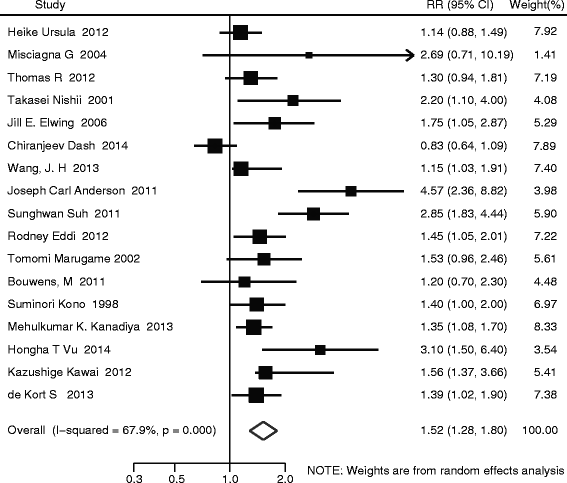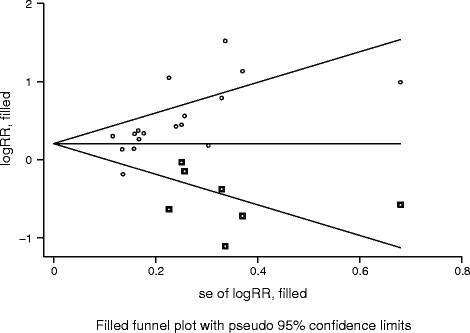Type 2 diabetes mellitus and risk of colorectal adenoma: a meta-analysis of observational studies
- PMID: 27535548
- PMCID: PMC4989384
- DOI: 10.1186/s12885-016-2685-3
Type 2 diabetes mellitus and risk of colorectal adenoma: a meta-analysis of observational studies
Abstract
Background: To summarize the relationship between type 2 diabetes mellitus (T2DM) and risk of colorectal adenomas (CRA), we performed a meta-analysis of observational studies.
Methods: To find studies, we searched PubMed, Embase, the Cochrane Library, Web of Science and conference abstracts and related publications for American Society of Clinical Oncology and the European Society of Medical Oncology. Studies that reported relative risks (RRs) or odds ratios (ORs) with 95 % confidence intervals (CIs) for the association between T2DM and risk of CRA were included. The meta-analysis assessed the relationships between T2DM and risk of CRA. Sensitivity analyses were performed in two ways: (1) by omitting each study iteratively and (2) by keeping high-quality studies only. Publication bias was detected by Egger's and Begg's tests and corrected using the trim and fill method.
Results: This meta-analysis included 17 studies with 28,999 participants and 6798 CRA cases. We found that T2DM was a risk factor for CRA (RR: 1.52; 95 % CI: 1.29-1.80), and also for the advanced adenoma (RR: 1.41; 95 % CI: 1.06-1.87). Patients with existing T2DM (RR: 1.56; 95 % CI: 1.16-2.08) or newly diagnosed T2DM (RR: 1.51; 95 % CI: 1.16-1.97) have a risk of CRA. Similar significant results were found in retrospective studies (RR: 1.57; 95 % CI: 1.30-1.89) and population based cross-sectional studies (RR: 1.46; 95 % CI: 1.21-1.89), but not in prospective studies (RR: 1.27; 95 % CI: 0.77-2.10).
Conclusions: Our results suggested that T2DM plays a risk role in the risk of developing CRA. Consequently, medical workers should increase the rate of CRA screening for T2DM patients so that they can benefit from behavioural interventions that can help prevent the development of colorectal cancer. Additional, large prospective cohort studies are needed to make a more convincing case for these associations.
Keywords: Colorectal adenoma; Meta-analysis; Type 2 diabetes mellitus.
Figures
Similar articles
-
Diabetes mellitus increases the risk of colorectal neoplasia: An updated meta-analysis.Clin Res Hepatol Gastroenterol. 2016 Feb;40(1):110-23. doi: 10.1016/j.clinre.2015.05.021. Epub 2015 Jul 7. Clin Res Hepatol Gastroenterol. 2016. PMID: 26162991
-
Circulating leptin levels and risk of colorectal cancer and adenoma: a case-control study and meta-analysis.Cancer Causes Control. 2013 Dec;24(12):2129-41. doi: 10.1007/s10552-013-0290-1. Epub 2013 Oct 2. Cancer Causes Control. 2013. PMID: 24085585
-
Hyperinsulinemia, insulin resistance and colorectal adenomas: A meta-analysis.Metabolism. 2015 Oct;64(10):1324-33. doi: 10.1016/j.metabol.2015.06.013. Epub 2015 Jun 20. Metabolism. 2015. PMID: 26169471
-
Hormone replacement therapies, oral contraceptives, reproductive factors and colorectal adenoma risk: a systematic review and dose-response meta-analysis of observational studies.Colorectal Dis. 2019 Jul;21(7):748-759. doi: 10.1111/codi.14582. Epub 2019 Mar 22. Colorectal Dis. 2019. PMID: 30748083
-
Metformin therapy and the risk of colorectal adenoma in patients with type 2 diabetes: A meta-analysis.Oncotarget. 2017 Jan 31;8(5):8843-8853. doi: 10.18632/oncotarget.13633. Oncotarget. 2017. PMID: 27903961 Free PMC article. Review.
Cited by
-
Bowel Preparation for Colonoscopy in Patients with Diabetes Mellitus-A Gap We Have to Bridge: A Review.J Clin Med. 2025 May 11;14(10):3336. doi: 10.3390/jcm14103336. J Clin Med. 2025. PMID: 40429332 Free PMC article. Review.
-
Impact of type 2 diabetes on adenoma detection in screening colonoscopies performed in disparate populations.World J Clin Cases. 2021 Apr 16;9(11):2433-2445. doi: 10.12998/wjcc.v9.i11.2433. World J Clin Cases. 2021. PMID: 33889609 Free PMC article.
-
Helicobacter pylori Eradication Regressed Gastric Hyperplastic Polyp: A Randomized Controlled Trial.Dig Dis Sci. 2020 Dec;65(12):3652-3659. doi: 10.1007/s10620-020-06065-0. Epub 2020 Jan 23. Dig Dis Sci. 2020. PMID: 31974914 Clinical Trial.
-
Self-reported Metabolic Risk Factor Associations with Adenomatous, Sessile Serrated, and Synchronous Adenomatous and Sessile Serrated Polyps.Cancer Prev Res (Phila). 2021 Jul;14(7):697-708. doi: 10.1158/1940-6207.CAPR-20-0664. Epub 2021 May 4. Cancer Prev Res (Phila). 2021. PMID: 33947705 Free PMC article.
-
Hematopoietically expressed homeobox gene is associated with type 2 diabetes in KK Cg-Ay/J mice and a Taiwanese Han Chinese population.Exp Ther Med. 2018 Jul;16(1):185-191. doi: 10.3892/etm.2018.6152. Epub 2018 May 10. Exp Ther Med. 2018. PMID: 29896239 Free PMC article.
References
-
- Tripathi BK, Srivastava AK. Diabetes mellitus: complications and therapeutics. Med Sci Monit. 2006;12(7):Ra130–47. - PubMed
-
- Adenoma. http://en.wikipedia.org/wiki/Adenoma. Accessed 10 Oct 2014.
Publication types
MeSH terms
Substances
LinkOut - more resources
Full Text Sources
Other Literature Sources
Medical





